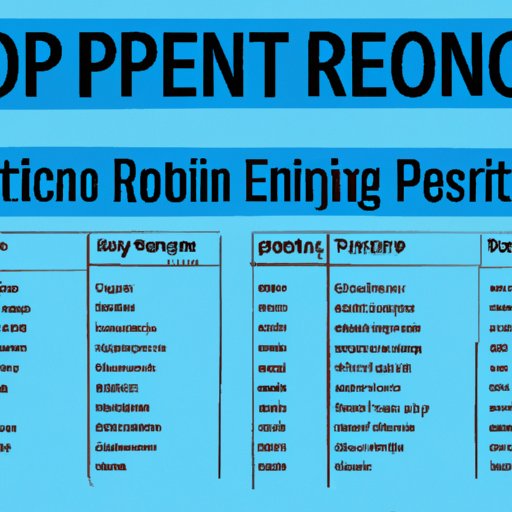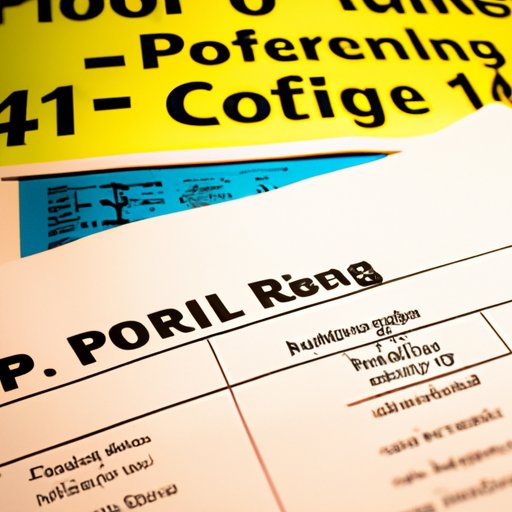Introduction
A police report is an official document that provides a detailed account of an incident or crime. It includes information such as the names of those involved, the location of the incident, the time it occurred, and any witnesses or evidence collected. The purpose of a police report is to provide an accurate record of what happened in order to assist with investigations, court cases, and insurance claims.
This article will explore the length of time needed to get a police report. It will provide a comprehensive guide to understanding the process and timeline for obtaining a police report, as well as examining the factors that can impact the speed of getting a police report.

A Comprehensive Guide to How Long it Takes to Receive a Police Report
When a person calls the police to report an incident, they may be curious about how long it will take to get a police report. It is important to note that there is no one-size-fits-all answer to this question, as the amount of time needed to get a police report can vary depending on a number of factors.
An Overview of the Length of Time Needed to Get a Police Report
Generally speaking, it can take anywhere from a few days to several weeks to receive a police report. This depends largely on the complexity of the case, the resources available to the police department, and the state laws governing the release of police reports. In some cases, it can even take months to obtain a police report.
Breaking Down the Timeline for Obtaining a Police Report
The length of time needed to get a police report can be broken down into three distinct stages:
- Reporting the Incident: This is the first step in the process and involves the initial call to the police to report the incident. Depending on the nature of the incident, the police may need to respond to the scene or may be able to take the report over the phone.
- Investigation: Once the initial report has been taken, the police will begin their investigation. This includes gathering evidence, interviewing witnesses, and consulting with experts. The length of time required for the investigation will depend on the complexity of the case.
- Writing the Report: Once the investigation is complete, the police officer assigned to the case will write up a report. This will include all relevant information about the incident and will be used to aid in any future legal proceedings.
How Long is the Wait For a Police Report?
Once the police have completed their investigation and written up the report, the wait for the actual police report can begin. The length of time required to receive a police report can vary depending on a number of factors, which will be discussed in more detail below.
What is the Average Timeframe for Receiving a Police Report?
The average timeframe for receiving a police report is typically between two and four weeks. However, this timeframe can be shortened or extended depending on the circumstances of the case and the resources available to the police department.
Examining the Process and Timeline to Get a Police Report
In order to understand the timeline for getting a police report, it is important to look at the process. Generally, the process proceeds as follows:
- Report Writing: Once the police have finished their investigation, they will write up the report. This typically takes a few days but can take longer if the case is complex.
- Review and Approval: After the report is written, it must then be reviewed and approved by the police department. This can take anywhere from a few days to a few weeks depending on the size of the department and the resources available.
- Release: Once the report has been approved, it will be released to the public. Some states require that the report be made available within a certain timeframe, while others do not.
It is important to note that the length of time needed to get a police report can vary depending on the state in which the incident occurred. For example, some states require that the report be released within a certain timeframe, while others do not. Additionally, some states may require a fee for the release of the report, which can add additional time to the process.
Exploring the Factors That Impact the Speed of Getting a Police Report
When it comes to the length of time needed to get a police report, there are a number of factors that can affect the speed of the process. These include:
State Laws
The state in which the incident occurred will have laws governing the release of police reports. Some states require that the report be released within a certain timeframe, while others do not. Additionally, some states may require a fee for the release of the report, which can add additional time to the process.
Processing Times
The length of time needed to get a police report will also depend on the resources available to the police department. If the department is short staffed or does not have the necessary equipment, it could take longer for them to complete the report. Additionally, if the case is complex and requires extensive investigation, it could take longer for the report to be written and approved.
Location
The location of the incident can also affect the length of time needed to get a police report. If the incident occurred in an area with high crime rates or a large population, it could take longer for the police to respond and investigate the incident. Additionally, if the incident occurred in a rural area, it may take longer for the police to travel to the scene and gather evidence.
Other Factors
There are other factors that can also affect the length of time needed to get a police report. These include the availability of witnesses, the complexity of the case, and the resources available to the police department. Additionally, the type of incident being reported can have an effect on the speed of the process. For example, it may take longer to receive a police report for a murder than it would for a minor theft.
Conclusion
In conclusion, it is important to note that the length of time needed to get a police report can vary depending on a number of factors. Generally, it can take anywhere from a few days to several weeks to receive a police report. However, this timeframe can be shortened or extended depending on the circumstances of the case and the resources available to the police department.
When considering the length of time needed to get a police report, it is important to keep in mind the factors that can impact the speed of the process, such as state laws, processing times, location, and other factors. By understanding these factors, individuals can gain a better understanding of the timeline for obtaining a police report.
Summary of Key Points
- It can take anywhere from a few days to several weeks to receive a police report.
- The length of time needed to get a police report can vary depending on the complexity of the case, the resources available to the police department, and the state laws governing the release of police reports.
- When considering the length of time needed to get a police report, it is important to keep in mind the factors that can impact the speed of the process, such as state laws, processing times, location, and other factors.
Advice for Those Waiting for a Police Report
If you are waiting for a police report, it is important to remain patient and understand that the process can take some time. Additionally, it is important to contact the police department periodically to check on the status of the report. By doing so, you can ensure that the process is moving along and that you will receive your report in a timely manner.
(Note: Is this article not meeting your expectations? Do you have knowledge or insights to share? Unlock new opportunities and expand your reach by joining our authors team. Click Registration to join us and share your expertise with our readers.)
